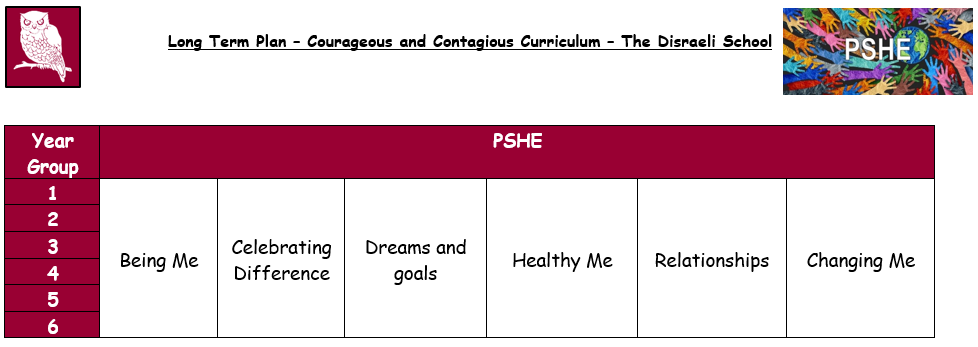PSHE

Intent
To ensure children are confident and comfortable to express their emotions and opinions, have an awareness of how others around them may be feeling and are able to respect both themselves and those around them.
At The Disraeli School, we believe that PSHE helps to give our pupils the knowledge, skills and understanding they need to lead confident, healthy and independent lives. At our school we are committed to ensuring that children are confident and comfortable to express their emotions and opinions, have an awareness of how others around them may be feeling and are able to respect both themselves and those around them. At our school we are committed to ensuring that the emotional and social needs of all our children are met within our school environment, and we support the development of children’s health and wellbeing, self-esteem and confidence. We also believe that building resilience in our children and instilling the fundamental core principles of British values and school values to keep them safe and enable them to make a positive contribution to the community in which they live.
Aims
Through our PSHE curriculum, we aim that our pupils will:
- develop culturally, emotionally, morally, socially and spiritually
- develop self-awareness, self-confidence, self-efficacy and self-responsibility
- understand and implement our British Values
- value themselves and others
- acknowledge, appreciate and be accepting of difference and diversity
- be independent, compassionate, responsible and active members of the school and the local community
- learn to make informed choices
- be prepared to be positive and active members of a democratic society
- understand what constitutes a safe and healthy lifestyle
- develop the ability to form good interpersonal relationships
- understand, manage and regulate their emotions
- have opportunities to consider issues which may affect their own lives and/or the lives of others
- have the confidence and courage to speak up when they feel something is not right
- become critical thinkers
- keeping themselves safe from harm, for example, grooming and radicalisation
Implementation
At Disraeli, we use the PSHE Assocation programme of study to deliver a clear and comprehensive PSHE curriculum, which is adapted to provide appropriate and relevant learning to support all pupils.
In EYFS, PSHE is taught and embedded throughout the curriculum. The objectives taught are the Personal, Social, Emotional Development statements from the ‘Development Matters in the EYFS’ and the PSED Early Learning Goals.
In Key Stage 1 and Key Stage 2 we cover the three core themes in line with the PSHE Association’s programme of study. The core themes covered throughout the academic year are: Health and Wellbeing, Relationships and Living in the Wider World. Statutory relationships and health education are taught through PSHE, including non-statutory sex education in upper KS2.
All lesson objectives are devised in such a way that the learning skills for each year group are progressive and age appropriate. This is evident when looking at the spiral curriculum documents. Being part of the PSHE Association ensures that the resources we have access to and use have been quality checked and approved by the Association themselves.
Equal Opportunities and Inclusion
PSHE can make a significant contribution to Inclusion, particularly in its focus on promoting respect and equality for all. All pupils at our school will have the opportunity to access the PSHE curriculum, irrespective of ability, culture, ethnicity, gender, race, religion or social background. Where appropriate, activities will be adapted and tailored to the needs of the individuals to facilitate this effectively.
Assessment, recording and reporting
In the EYFS, class teachers assess children’s development and progress in PSHE by making informal judgements as they observe children. Alongside these judgements, teachers use the personal, social and emotional objectives (as stated in Development Matters) to make more formal judgements of children’s progress and development in this prime area of learning. Teachers keep a record of children’s achievements through observations, evaluations, or photographs/videos.
In Key Stage 1, class teachers make use of ongoing observations to assess children’s progress in PSHE. Class teachers complete a formal PSHE assessment (draw and write) at the start and end of each theme (termly).
In Key Stage 2, class teachers share the topic for the half term with the children and then ask them to complete a mind map to show their pre-existing knowledge. At the end of the half term, children then return to this mind map to add what they have learnt. This helps both teachers and pupils to see clear progress and allows teachers the opportunity to address any misconceptions and inform future planning and discussions.
Monitoring and evaluation
The Senior Leadership Team and PSHE leads are responsible for monitoring the standards of children’s progress and achievement, and quality of teaching. We check that all appropriate topics are being taught and will spend some time listening to pupil voice and speaking to the children to ensure they feel safe and confident within their PSHE lessons. PSHE is a vital area of education, the PSHE leads monitor progress and attainment in line with all other national curriculum subjects.
Impact
High quality PSHE contributes to children’s personal development. Through our PSHE curriculum, children look after their health and wellbeing, form and maintain healthy relationships with other children and adults, and know how to keep themselves safe, both on and off-line. They have an understanding of financial literacy, and have the knowledge and skills to apply what they have learnt in their everyday lives. Our PSHE curriculum is designed so that children make positive choices about their lives, both now and in the future. They will have self-awareness, self-confidence, self-efficacy and self-responsibility, valuing themselves and others within the whole-school and local community. They will have a deeper understanding of our British Values, school values and be champions for equality, becoming positive and active members of a democratic society in their own local communities and beyond throughout their lives.
Curriculum subject links
Curriculum-Gallery (ID 1060)
-
EnglishReading and Writing
-
PhonicsLearning to read
-
MathematicsMaths across the school
-
HistoryLearning about the past
-
GeographyAll around the world
-
ScienceHow things work
-
PEPhysical Education
-
RSERelationships and Sex Education
-
PSHEPersonal, Social, Health Education
-
ComputingInformation and Digital Technology
-
MusicPlaying, Appreciation and Notation
-
REReligious Education
-
Modern Foreign LanguageFrench
Modern Foreign Language
-
ArtArt and Design
-
Design and TechnologyDesign, Make, Evaluate and Technical Knowledge
Design and Technology


